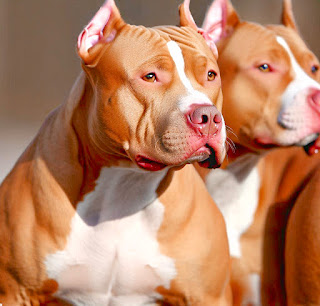 |
| Problems in Red Nose Pitbulls |
Red Nose Pitbulls are beloved for their loyalty, strength, and unique appearance. Like any dog breed, they can be susceptible to certain health problems that owners should be aware of. In this article, we will explore common health issues that may affect Red Nose Pitbulls, discuss preventive measures, and emphasize the importance of regular veterinary care for maintaining their overall well-being.
Hip Dysplasia:
Hip dysplasia is a common orthopedic condition that can affect Red Nose Pitbulls. It occurs when the hip joint doesn't develop properly, resulting in the thighbone not fitting snugly into the hip socket. Symptoms include lameness, difficulty rising or walking, and reduced activity levels. Proper nutrition, regular exercise, and maintaining a healthy weight can help minimize the risk of hip dysplasia. Responsible breeders often perform hip evaluations on their breeding dogs to reduce the likelihood of passing on this condition to offspring.
Skin Allergies:
Red Nose Pitbulls can be prone to various skin allergies, such as atopic dermatitis and contact dermatitis. Allergies can be triggered by environmental factors, such as pollen or certain foods. Symptoms include itching, redness, hair loss, and recurrent ear infections. Identifying and avoiding allergens, regular bathing with appropriate products, and implementing a balanced diet can help manage skin allergies. Consulting with a veterinarian and conducting allergy tests may be necessary to pinpoint specific triggers and develop an appropriate treatment plan.
Heart Disease:
Red Nose Pitbulls, like many other dog breeds, can be susceptible to heart disease, including dilated cardiomyopathy (DCM) and mitral valve disease (MVD). These conditions affect the structure and function of the heart, potentially leading to heart failure. Regular veterinary check-ups that include cardiac evaluations, as well as providing a balanced diet and appropriate exercise, can help detect and manage heart disease. Responsible breeders often perform cardiac evaluations on their breeding dogs to minimize the risk of passing on inherited heart conditions.
Brachycephalic Syndrome:
While not exclusive to Red Nose Pitbulls, brachycephalic syndrome can affect dogs with short, broad skulls, including Pitbulls. This syndrome involves respiratory difficulties due to narrowed airways. Symptoms include snoring, noisy breathing, exercise intolerance, and overheating. Owners should ensure their Red Nose Pitbulls have access to cool and well-ventilated environments, avoid strenuous exercise in hot weather, and consult with a veterinarian regarding management options.
Other Considerations:
Regular dental care is essential for Red Nose Pitbulls to prevent dental disease, such as periodontal disease and tooth decay. Providing appropriate chew toys and regular teeth brushing can help maintain good oral hygiene. Additionally, Red Nose Pitbulls should be monitored for eye conditions, such as cataracts or progressive retinal atrophy (PRA), which can lead to vision impairment or blindness.
Conclusion:
While Red Nose Pitbulls are generally healthy and resilient dogs, it is important for owners to be aware of potential health issues that may affect them. Responsible ownership includes regular veterinary check-ups, providing a balanced diet, appropriate exercise, and maintaining a clean and safe environment. Early detection, prompt treatment, and preventive measures are key to addressing health problems in Red Nose Pitbulls and ensuring they live long, happy, and healthy lives. With proper care and attention, these remarkable dogs can thrive as loyal and loving companions for many years to come.
No comments:
Post a Comment